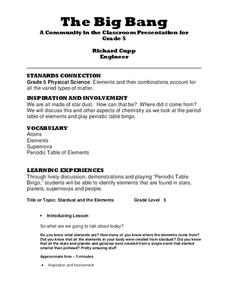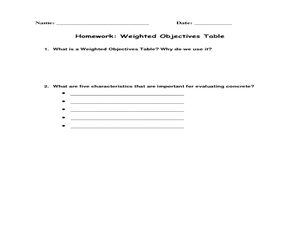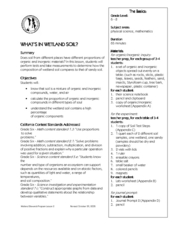Curated OER
Going Graph-y
Second graders listen to and dicuss the story Where the Wild Things Are. They play a pantomime game and act out various feelings so their classmates can guess. They listen for the frequency of certain words, and record their findings on...
Math Can Take You Places
Picture This
Engage scholars in a ratio lesson that employs real-world scenarios. Learners will compare the length and width of pictures and use a table to identify ratio patterns. They watch "Math Can Take You Places" and discuss jobs that use math...
Curated OER
Wetland in a Pan
Seventh graders build a watershed from various materials. In this life science lesson plan, the students will be able to change the design of their watershed to see the changes in the way the water will drain. Each group will be able to...
Chemistry Teacher
Metals, Nonmetals, and Metalloids Lab
What an exciting way to introduce your blossoming chemists to the world of metals, nonmetals, metalloids, and polymers! Here is a lab activity that is designed to allow pupils the opportunity to visualize the reaction of metals,...
Chymist
Build a Spectroscope
Assist your emerging scientists with construction of their very own spectroscopes. Individuals construct a spectroscope to identify elements used in varying lights within a particular environment. They conclude the activity with a class...
Virginia Department of Education
Metals, Nonmetals, and Metalloids
How can one easily classify metals, nonmetals, and metalloids? Pupils answer this question as they experiment with unknown substances and perform tests on conductivity, brittleness, and malleability to determine which unknown belongs in...
University of Georgia
What's So Special about Bottled Drinking Water?
Is artesian water designed to be better, or is it just from wells similar to those in the city of Artesium? This experiment looks at many different types of bottled waters, including artesian. Using a soap mixture, scholars test to see...
Curated OER
Table Tennis
Students participate in a table tennis game. In this sports lesson, students are taught the rules of the game and various grips to use. Students practice handling the paddle by dribbling the ball one hundred times.
Curated OER
The Big Bang
Fifth graders relate the elements in the human body to those produced during a supernova. In this space science and chemistry lesson, 5th graders listen to a lecture and view visuals about the big bang. They relate the production of...
Curated OER
The Write Stuff to Get the Job
Learners conduct Internet research to determine how to properly create a cover letter, resume and follup-letter. Students then create their own letters and resumes using the Resume Wizard in Microsoft Word.
Curated OER
The Periodic Table
In this periodic table worksheet, learners complete a crossword puzzle given 19 clues about elements, symbols, properties of elements, atomic number and atomic masses of elements.
Curated OER
The Periodic Table
In this periodic table worksheet, students answer 10 questions about the periodic table, the elements in the periodic table, the properties of elements and the atomic number, symbol and name of elements in groups of the periodic table.
Curated OER
Weighted Objectives Table and Optimum Mix Sheet
Young scholars analyze data and determine an appropriate concrete mixture. In this technical solutions lesson plan, students discuss weighted objectives, review sample scenarios, and rate concrete recipes to identify how well water...
Curated OER
What's in Wetland Soil?
Students examine the organic and inorganic components of soil. For this environmental science lesson, students identify the factors that influence soil formation. They collect soil samples, conduct tests, and analyze the results.
Curated OER
Stream Table
Students explore channelization, riparian habitats and soil erosion to find out about the aquatic habitats in Iowa. In this aquatic habitats lesson, students define important terms and read an article about pollution. Students complete...
Curated OER
What's in the Water?
Fifth graders use the dots to simulate water pollutants in a lake. They use cups to collect a sample of "water." Students sort the dots by color and record the number of each dot color under the correct pollutant name in the Lake Water...
Curated OER
"Measurement in Motion"
Ninth graders examine the rate of motion and changes in motion using a ramp and a rolling object. They conduct the demonstration, determine the average speed, and describe how a moving object can have zero acceleration and deceleration.
Curated OER
Filter-Feeding in Reef Sponges
Students make observations and describe the filter-feeding in sponges as it relates to the ecological role of sponges on coral reefs. In this filter-feeding in reef sponges lesson, students are introduced to the feeding methods of...
Curated OER
The Tobacco Time Bomb: What's In A Cigarette?
In this enlightening and disturbing health lesson, students read and discuss information on smoking and closely-look at the ingredients in a cigarette. You will be amazed at the list of ingredients that are found in cigarettes. This...
Curated OER
Interpreting Graphs
Sixth graders interpret linear and nonlinear graphs. They create graphs based on a problem set. Next, they represent quantitive relationships on a graph and write a story related to graphing.
Curated OER
Data Analysis and Probability: Graphing Candy with Excel
Collect and graph data using Microsoft Excel with your math class. They will make predictions about the number of each colored candy in a bag of M&M's, then sort, classify, count, and record the actual data before using Excel to...
Laboratory for Atmospheric and Space Physics
Growing Up With A Mission
New Horizons began its journey to Pluto in 2006. Ten years later, it continues its mission. In that time, scholars have surely grown, but how much more will they grow by the time New Horizons reaches its destination? Find out with an...
Rational Number Project
Rational Number Project: Initial Fraction Ideas
Deepen the fractional number sense of young learners with this introductory instructional activity on equivalent fractions. After completing a short warm-up activity, children go on to work in pairs using fraction circles to complete a...
University of Colorado
Modeling Sizes of Planets
The density of the huge planet of Saturn is 0.7 g/cm3, which means it could float in water! In the second part of 22, science pupils explore the size and order of the planets. They then calculate weight and/or gravity and density of...

























